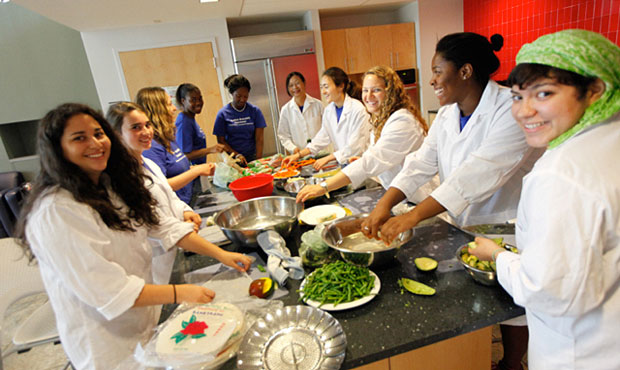More programs added to Justice Brandeis Semester
Deadline to apply for programs providing small group, experiential learning is March 17
 Photo/Mike Lovett
Photo/Mike LovettStudents participate in the cooking lab in the Food, Lifestyle and Health program.
This summer, students can choose from 11 immersive, experiential learning programs, the most to date and more than tripling last summer’s offerings. Also new this year, Brandeis is opening the program to students enrolled at other universities.
The expansion of the Justice Brandeis Semester is part of Brandeis’ commitment to creating and supporting intensive learning experiences with enduring impact, a central goal of the university’s strategic plan.
“The Justice Brandeis Semester provides students with the opportunity to do a deep dive into a topic, to combine traditional classroom studies with a mix of field work and community-engaged learning, and to develop a real sense of whether the area of study is something they want to pursue further as a career or in graduate studies,” says Dan Perlman, associate provost of innovation in education.
Students enrolled in the Justice Brandeis Semester take three courses that cover a central theme and are designed to complement each other. They earn 12 credits for successfully completing the semester, which runs eight to 10 weeks.
This summer’s programs cover a wide range of topics, from democracy in America to immigration and education to real estate development. More information on the programs offered, the academic calendar and the application process are available on the Justice Brandeis Semester site.
One of the new programs will focus on archeological methodology. Led by professors Donald Slater and Javier Urcid, Exploring the Past, Impacting the Future: Archeological Field School will merge classroom instruction with hands-on original fieldwork and laboratory analysis, including a study of the Harrington House, which was built around 1737 and is the oldest structure on the Brandeis campus.
“To learn about archeology, you need to literally dig in and get your hands dirty,” says Slater. “We are excited about using an immersive approach to archeological studies that focuses on theory and practice in a small group setting. It will be interesting to see what archeological insights we have made individually and as a group at the end of the program.”
Building on the success of her program last summer, professor Elaine Lai, together with professor Lindsay Rosenfeld, will again co-direct Food, Lifestyle and Health. Lai developed the program to provide students with the opportunity to study the social, biological, behavioral and environmental factors that contribute to the diabetes epidemic as well as the link between diet and health. The students also participate in a food lab to learn “hands on” about nutrition and its impact on health.
“The prevalence of diabetes is so great, not only in the U.S. but also globally and this growing epidemic is having large human, societal and economic costs,” says Lai. “By studying the biology of diabetes, the science of nutrition and health, and social policy, we can help the students better understand the impact of this epidemic and to possibly address this issue.”
Lai says another goal of the program is to inspire the students to extend their learning. “We hope this program not only affects how they live their lives, but also in their choice of careers, whether it is in providing health care, informing the public about health care issues or influencing health care policy.”
The deadline to apply for a Justice Brandeis Semester program is Monday, March 17.
Categories: Business, Humanities and Social Sciences, Science and Technology, Student Life





